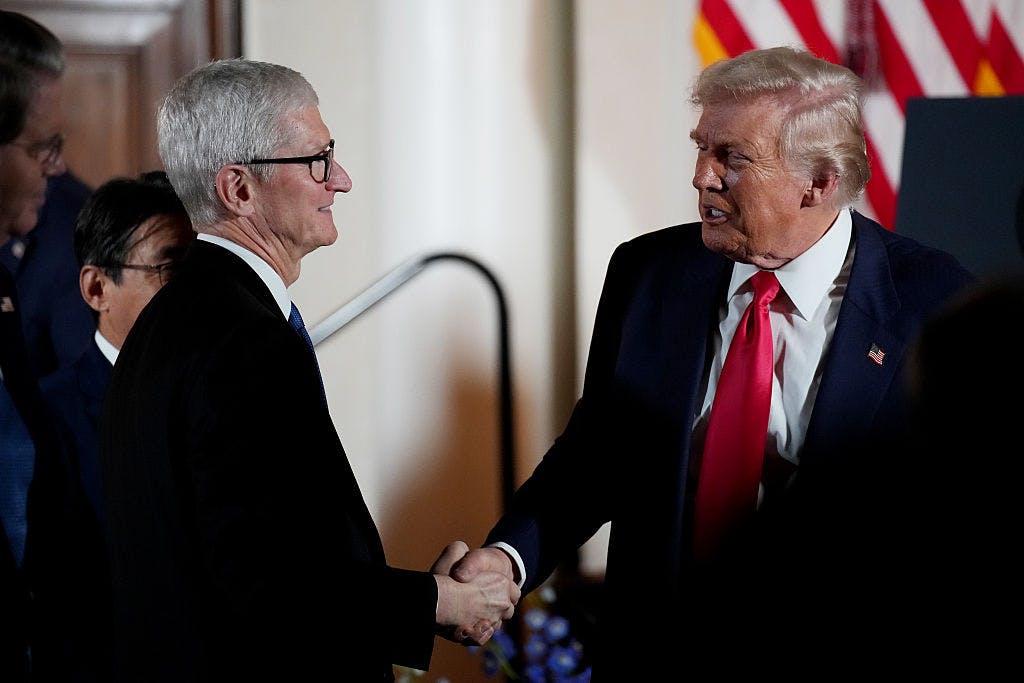Apple and Nvidia are showing how China failures are no barrier to unparalleled stock market success
China-exposed companies are crushing the S&P 500 this year. That’s because “China-exposed company” is just another term for “high-growth company.”
Nvidia and Apple are the two most valuable publicly traded companies in the world.
One big thing the two tech behemoths have in common: they’ve ascended to those lofty heights despite their China businesses being in the penalty box this year.
Tariffs have weighed on Apple’s operations and its sales in Greater China are down year on year in eight of its last nine quarters. Nvidia has been effectively shut out of China’s AI market for much of the year due to export restrictions.
And yet...
Apple’s latest earnings report propelled the company to hitherto unseen heights despite sales in Greater China coming in at $14.5 billion, 11.8% shy of estimates and down 3.6% year on year.
Today, Nvidia CEO Jensen Huang said he doesn’t know if he’ll ever be able to sell Blackwell chips to China. But that hasn’t stopped the chip designer from booking more than $500 billion in orders for its Blackwell and Rubin AI GPUs through next year.
The state of the US economy and markets in 2025:
Businesses have enough money to buy AI chips from Nvidia, and if not, investors are willing to finance their efforts to do so.
High-end consumers don’t balk at spending a pretty penny on Apple hardware that has new A19 chips.
But younger and lower-income consumers don’t have the wherewithal to buy guac and chips from Chipotle.
Success, despite a lack of ability to boost sales in the world’s second-largest economy, tells us two very different things about these two market leaders.
For Apple, it speaks to its moat, brand, and platform, which enable Services revenues to continue to climb.
Even if the iPhone upgrade cycle is less about how good the new phones are and more about how old customers’ existing phones are — iPhone buyers are a loyal bunch.
Update for Apple’s Q1 guidance: I upgraded to the iPhone 17 Pro yesterday to stay in the blue bubble gang. Even as a relative luddite, getting one new piece of Apple hardware every couple years, that’s still meant my monthly bill for its services — Apple Music and iCloud, mainly — has trended higher.
In short, Apple is a reminder of how robust the megacap tech titans’ businesses are before we even think about any returns from their aggressive AI build-outs.
On the other hand, Nvidia is all about that AI boost — which has been meaningfully accelerated by the hundred of billions that most megacap tech leaders (Apple, ironically, being a notable exception) are eager to spend to develop and implement this new technology. And they’re able to do that because of how strong their existing businesses are!
These ascensions to $4 trillion (and beyond!) market caps in spite of China challenges isn’t just an Apple and Nvidia story, but rather is broadly reflected in the performance of most US stocks that have elevated sales exposure to the world’s second-largest economy.
A Goldman Sachs basket of Russell 1000 companies with elevated sales exposure to China (excluding the semiconductor industry) has outperformed that benchmark meaningfully year to date.
And semiconductors, which are excluded from that aforementioned basket because they’d otherwise dominate it, are doing even better.
These firms, in spite of elevated trade tensions and tariff levels between the US and China, have seen forward earnings estimates climb by far more than the average large-cap US stocks this year. These days, a “China-exposed” company is just a “high-growth” company by another name.
